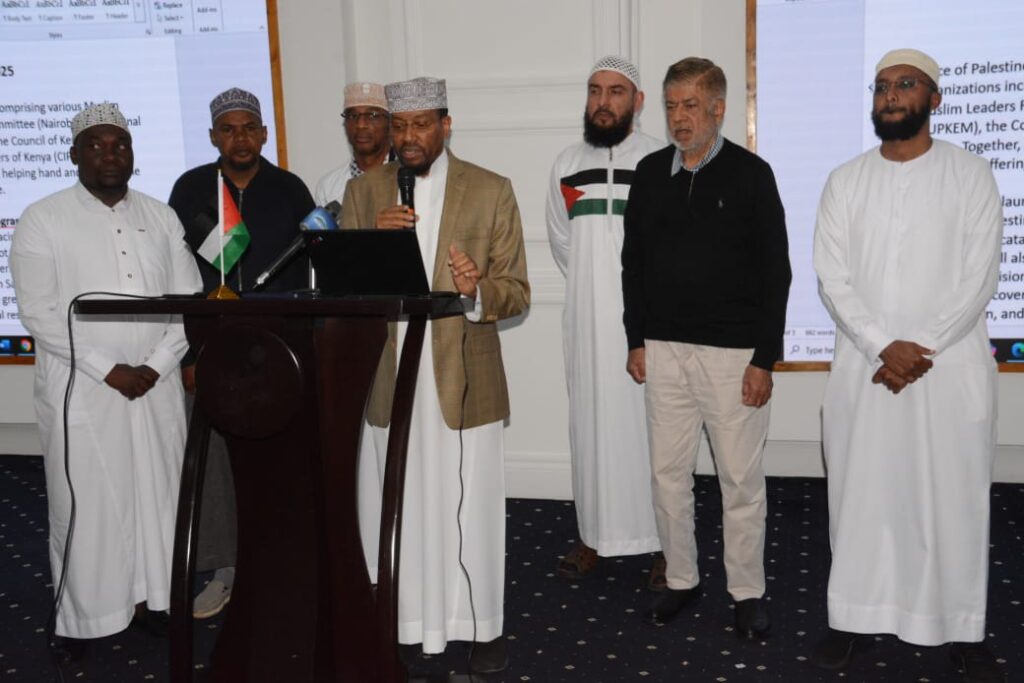
By Churchill Simiyu, Reporter
Nairobi, July 31, 2025 — Under the clear Nairobi skies and the weight of global injustice, a new form of resistance is taking root—literally. In a compelling blend of climate action and humanitarian solidarity, a coalition of leading Kenyan Muslim organizations has launched a nationwide tree-planting drive for Palestine. The campaign, led under the banner Voice of Palestine, is as much about hope as it is about justice.
Spearheaded by the Jamia Mosque Committee, NAMLEF, SUPKEM, and the Council of Imams and Preachers of Kenya (CIPK), this initiative seeks to raise both funds and awareness amid the ongoing humanitarian crisis in Gaza. The symbolism is striking: for every tree planted, a statement is made—that life must be preserved, dignity restored, and silence broken.
“This is more than a tree-planting campaign. It’s a moral stand,” said Ahmed Shariff, a spokesperson for the coalition. “It’s a call to protect life, restore dignity, and reclaim justice.”
The campaign launch comes at a time when Gaza is enduring what many international observers and human rights groups describe as a genocide. Over 70,000 lives have been lost, the majority being women and children, in more than two years of relentless military assault. With over 2.3 million Palestinians displaced, and humanitarian convoys blocked at key crossings, the suffering is compounded by what organizers call a shameful silence from the global community.
The coalition didn’t stop at symbolism. In a strong statement directed at policymakers, they called on the Kenyan government to:
Demand an immediate ceasefire in Gaza,
Push for unrestricted humanitarian access, and
Reassess diplomatic relations with Israel.
There were powerful reminders that Kenya, too, has known the sting of injustice. Speakers at the event drew chilling comparisons to Kenya’s colonial history and the international failure to intervene during the 1994 Rwandan Genocide. The Muslim Kadhi delivered a particularly fiery address, criticizing not only Western powers like the U.S., U.K., and Germany for arming and backing the conflict, but also Kenyan Muslim lawmakers who, he claimed, have chosen silence over principle.
“If you’re scared to speak up, then step aside,” the Muslim Kadhi challenged, addressing the youth and fellow leaders alike.
He also took aim at misinformation, warning that many young Kenyans—unknowingly—parrot colonial narratives shared online. Citing the historical example of a Congolese child exhibited in a European zoo, the senator reminded the crowd that the fight against imperialism is far from over.
“Palestine will one day be free—just as Kenya gained her independence,” he said, adding with a grin, “I can’t share coffee with anyone who lacks moral clarity.”
The event concluded with a rallying call: for grassroots mobilization, for consumer boycotts of Israeli-aligned companies, and for public protest.
As I watched dozens of young Kenyans gather around saplings, I was struck by the quiet defiance in the act. These trees are more than environmental tokens—they are living protests. In planting them, Kenyans are choosing to remember Gaza’s pain, to honor its struggle, and to stand up—rooted in both faith and conscience.
From Nairobi’s dusty grounds to Palestine’s broken cities, a message is growing tall: justice may be delayed, but it will not be denied.

More Stories
Breaking Down Barriers: Empowering Persons with Disabilities in Kenya
Press Statement by the Cabinet Secretary for Health, Aden Duale, in Response to Members of Parliament’s Statement on the Social Health Authority(SHA)
ADDRESS TO THE NATION BY HIS EXCELLENCY HON.WILLIAM SAMOEI RUTO, PRESIDENT OFKENYA on OCCASION OF THEKATIBA@15 ANNIVERSARY CELEBRATION